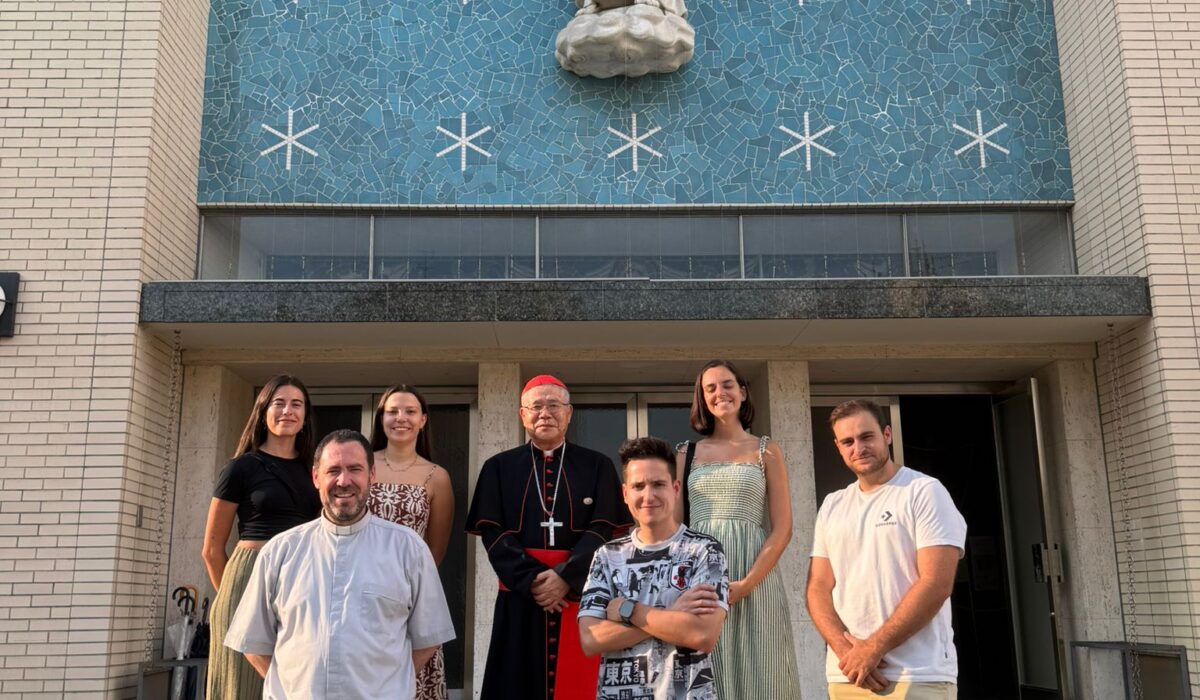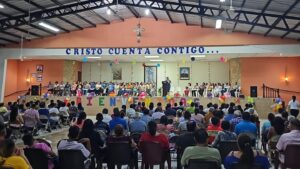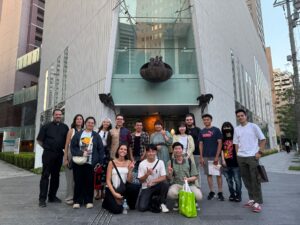 Yesterday afternoon, I dropped off my Spanish missionary friends at the Osaka airport. They have been helping me with the “De Colores” evangelization project in Japan. In fact, as I write these lines, they must be about to arrive in Madrid, where they live.
Yesterday afternoon, I dropped off my Spanish missionary friends at the Osaka airport. They have been helping me with the “De Colores” evangelization project in Japan. In fact, as I write these lines, they must be about to arrive in Madrid, where they live.
I would like to take this opportunity to reflect on what I have experienced so far as a result of the “De Colores” project. But perhaps I should first tell you a little about myself, so that you can better understand the context of this project.
My name is José Ramón, and I met Jesus Christ at the age of 24 at a Cursillo de Cristiandad (Christian retreat). That experience had a profound impact on my life and led me to live my Christian faith in a mature and responsible way. Over time, within the Cursillos de Cristiandad community in Madrid, I discovered my vocation to the priesthood. Eleven years ago, I was ordained a priest, and since then I have had the grace to continue collaborating as a priest in the Cursillos movement in Madrid, until two years ago when I arrived as a missionary in Osaka, Japan.
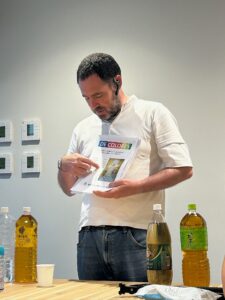 When I arrived here, I began to study Japanese. But that was not all: I also set out to learn about the culture, history, and customs of the Japanese people. As a missionary, I understand that in order to truly love those to whom we want to proclaim the Gospel, it is necessary to know their hearts. And so, little by little, I have been getting closer to the Japanese way of thinking, acting, and expressing themselves.
When I arrived here, I began to study Japanese. But that was not all: I also set out to learn about the culture, history, and customs of the Japanese people. As a missionary, I understand that in order to truly love those to whom we want to proclaim the Gospel, it is necessary to know their hearts. And so, little by little, I have been getting closer to the Japanese way of thinking, acting, and expressing themselves.
I soon realized what I consider to be the greatest deficiency of the Church in Japan: evangelization. This is a country where only 0.3% of the population is Catholic. That means that 99.7% know practically nothing about Jesus Christ. And I ask myself: what are we doing in the Catholic Church in Osaka to proclaim the Gospel to these people? I must say honestly that, at least in the parishes I know, I have seen very few initiatives aimed at addressing this essential mission.
Faced with this situation, I thought that perhaps the Cursillos de Cristiandad movement could be a good tool. And I thought this not because I wanted to “sell my book” here in Japan. I did not come to Japan to promote Cursillos de Cristiandad, but to proclaim Jesus Christ, especially to those who do not know him. But precisely for this reason, I recognize that the Cursillos movement can be a wonderful and very timely tool for fostering an evangelizing spirit among Christians and for showing the beauty of Christian life to those who do not yet know Christ.
 This is how the “De Colores” project was born in my heart, with the desire to revive the Cursillos in Japan. They arrived here in 1963 and spread rapidly throughout the country. However, little by little they faded away, and today there is barely one Cursillo a year in Nagasaki.
This is how the “De Colores” project was born in my heart, with the desire to revive the Cursillos in Japan. They arrived here in 1963 and spread rapidly throughout the country. However, little by little they faded away, and today there is barely one Cursillo a year in Nagasaki.
A year ago, we began to prepare this project with a small group of young people from Cursillos in Madrid and some friends I have made in Japan. We met once a month by videoconference, and as a result of that preparation, we have just had our first evangelizing experience in Japan.
On August 1, five Spanish missionaries who are Cursillistas arrived in Japan: Luis, Blanca, Alberto, Marta, and María. For a week, we visited places that are emblematic of Japanese history and culture around Osaka: Kyoto, Nara, Himeji, Koya-san… We were accompanied by a group of people who live here and whom I had invited to join the project: not only from the parish where I am, but also from other communities and from the Japanese school where I study. In the end, a very diverse and beautiful group was formed, with baptized Catholics and also unbaptized people who had never had any contact with Christianity.
During that week, we used the Cursillo methodology to grow in friendship and holiness. Each day, one of the Spanish missionaries gave a talk about their fourth day, which allowed the participants to get to know them better. But it was also very valuable to show here in Japan that it is possible to give personal witness by talking about one’s own life, something that is not very common in Japanese culture. After each talk, we had small group discussions, where we answered profound questions that helped us open our hearts and get to know each other better. Little by little, a sincere friendship centered on Christ began to emerge, even among those who had hardly heard of Him.
One of those days, it was my turn to give the talk, and what happened afterwards overwhelmed my heart. One of my guest friends, “Ko,” originally from Taiwan and who had never had contact with Christians, listened attentively to my testimony. When I finished, she came up to me with a big smile and said, “José Ramón, you have to learn Chinese!” I understood it as an invitation: the testimony I had just shared could also do a lot of good for Chinese people in their own language. And I thought that very few testimonies of this kind are heard in China. Since I started studying Japanese and saw how many Chinese people there are here, I told myself that when I finished Japanese, I would start studying Chinese so that I could proclaim Christ to them in their own language.
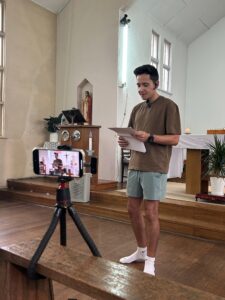 We celebrated Mass every day. It was beautiful to see how, little by little, even those who were not baptized began to understand the meaning of the Eucharist. I explained it to them simply, as I usually do in the courses. On the last day, one of the unbaptized girls confessed that she already missed participating in Mass. Surely because she had perceived the atmosphere of celebration and community that surrounds the celebration.
We celebrated Mass every day. It was beautiful to see how, little by little, even those who were not baptized began to understand the meaning of the Eucharist. I explained it to them simply, as I usually do in the courses. On the last day, one of the unbaptized girls confessed that she already missed participating in Mass. Surely because she had perceived the atmosphere of celebration and community that surrounds the celebration.
To close, as in a course, we held a closing ceremony in which each participant shared what the experience had meant to them. Everyone was very grateful. A Brazilian seminarian who is studying Japanese with me said that he thought the methodology was very good for evangelization in Japan. That made me very happy, because it is the same intuition that led me to start this project. And perhaps, God willing, I will be given a fellow priest for this mission.
I cannot end without a very special thanksgiving for the five Spanish missionaries who have helped me. Without them, this project would not have been possible. Each one has generously given his time, his strength, his money, and above all, his heart. And I have undoubtedly been one of the most blessed. Thank God for each one of them.
This project is not intended to be a one-off activity in the summer of 2025, but rather looks to the future. This year we have made initial contact, a kind of “cultural exchange” in which the essential thing we wanted to share is Jesus Christ. But next year we want to take a step further: to be able to hold a Cursillo in Osaka.
All of us who have taken part in the course around the world are on this journey. I am counting on your support, and I will keep you informed of every step so that you too can share in the wonders that God wants to accomplish here in Japan.
A big hug from Osaka.

